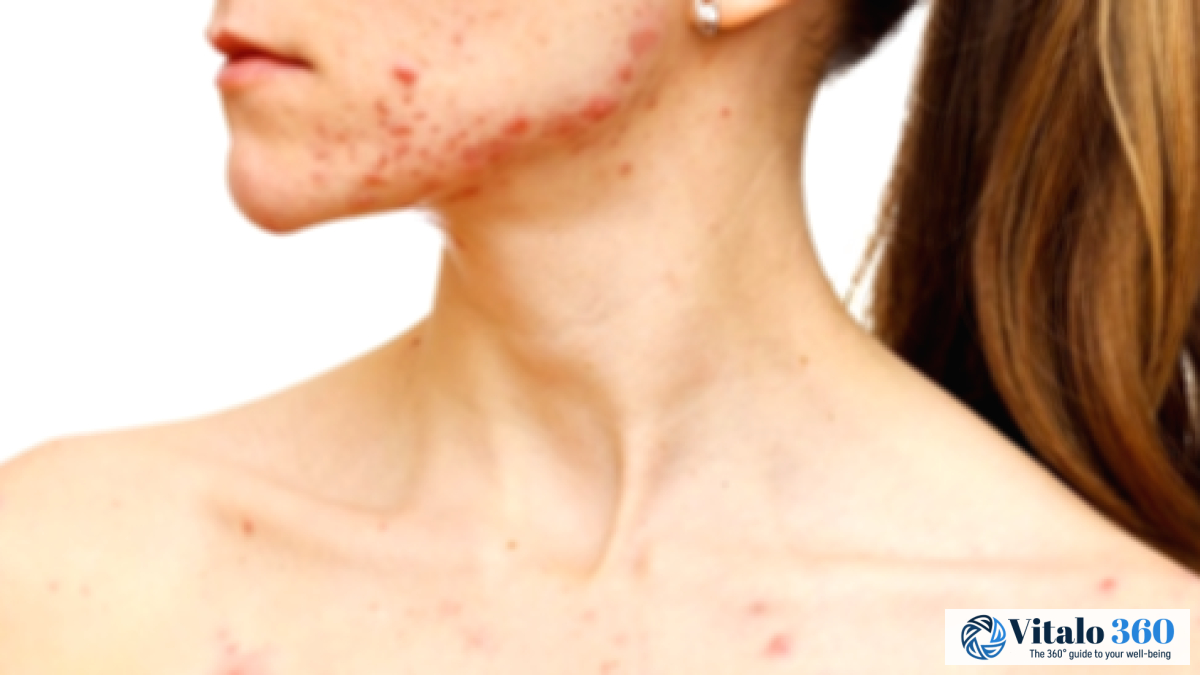.
Okay, so you’re dealing with chest acne and tryna figure out what’s up? We’ve all been there, right? It’s like, you get your face under control, and then BAM, your chest starts acting up.
We’re gonna break down what causes chest acne and, more importantly, what we can do about it. Stick around; we’ll explore this topic further!
- Causes of Chest Acne
- Forms of Chest Acne
- How to Avoid Chest Acne
- Differentiating Chest Acne from Allergies
- When to See a Dermatologist
Causes of Chest Acne
Okay, so what’s the deal with chest acne? There are a bunch of things that can trigger it, and here’s a few of the usual suspects:
- Hormonal changes.
- Eating too many sugary foods.
- Being a greaseball, I mean, excess oil production.
- Not showering after sweating it out, especially if your clothes are tight.
- Using scented or dyed body washes.
- Sunburn.
- Heavy lotions.
- Caking on makeup or perfumes.
Forms of Chest Acne
Chest acne can show up in a few different ways, right? It’s not just one-size-fits-all zit situation. These are some common forms:
- Pimples.
- Whiteheads.
- Blackheads.
- Cysts.
- Nodules.
How to Avoid Chest Acne
Alright, so prevention is kinda key, right? It’s way easier to stop chest acne before it starts than to deal with it after it pops up. Thing is, you kinda need to know what’s causing it, so you can steer clear of those triggers.
You can make some smart tweaks to help keep the breakouts away. A few easy tweaks to your routine, like the following:
- Showering right after you hit the gym, especially if you’re sweating buckets or using a gentle wipe.
- Cutting back on the sugary stuff.
- Using makeup, perfumes, or products made for the chest area.
- Wearing loose clothes, especially when it’s hot out.
- Washing workout clothes with fragrance-free detergent, if you’ve got sensitive skin.
- Using body washes specifically made to tackle acne.
- Exfoliating once a week—but not too hard!
- Moisturizing, but using something light and non-comedogenic.
- Keep your skin dry—especially if you are prone to sweat.
And hey, speaking of routines, what about our overall skin health? Sometimes chest acne can be a sign of a bigger issue, like dehydration or a vitamin deficiency. It might be worth chatting with a nutritionist or doctor to see if you’re getting all the right stuff in your diet to keep your skin happy.
Differentiating Chest Acne from Allergies
Now, allergies can look a lot like acne, but they’re not the same thing. Allergies, um, usually come with redness and itchiness caused by things like chemicals or fabrics. You might also get small bumps. What sets allergies apart is those little hives that pop up on your skin around the affected area.
A lot of people think they can treat allergies the same way they treat acne. While some of the treatments might overlap, they’re really different beasts.
You can usually tell allergies apart from acne pretty easily because allergies tend to cover a wider area of skin. You might also get other allergy symptoms like:
- Dry, flaky skin.
- Hives.
- Using thick creams.
- Avoiding scented products for sensitive skin.
- Taking antihistamines or allergy medicine.
When to See a Dermatologist
For many folks, chest acne can be managed at home without needing a doctor’s note. But, if you’ve tried what you can and you’re still battling chest acne, it might be time to call in the pros. Here’s when seeing a dermatologist is a good idea:
- When over-the-counter acne washes don’t seem to be helping.
- When you are seeing dark marks.
- When you need prescriptions for acne treatments.
But, people with cysts or nodules or a family history might consider a dermatologist—these types of acne can be stubborn. Plus, the doc can help stop scarring!
Also, prescription treatment might help prevent skin drying out.
Key takeaways
- Identifying the root cause is important to prevent Chest Acne.
- Consider seeing a doctor if Chest Acne persists or gets worse.
FAQ, Myth & Facts
Can stress cause chest acne?
Stress absolutely can trigger breakouts! When you’re stressed, your body cranks up the cortisol, which can lead to more oil production and inflammation—the perfect recipe for acne.
Is chest acne contagious?
Nope, chest acne isn’t contagious. It’s not caused by a virus or bacteria that can spread from person to person.
Does diet really affect chest acne?
Yeah, diet can play a role. Foods high in sugar and processed carbs can spike your blood sugar, leading to inflammation and potentially more breakouts.
I used to get chest acne all the time after working out. I switched to wearing looser shirts and showering right after the gym, and it’s made a huge difference.
I always thought acne was just a teenage thing, but then I started getting it on my chest in my 20s. Turns out, it was my body wash! I switched to something fragrance-free, and it cleared up in weeks.
I tried everything to get rid of my chest acne. I finally went to a dermatologist, and they put me on a prescription cream. It’s been a game-changer. I wish I’d gone sooner!
So, yeah, chest acne is a drag, but it’s definitely something we can tackle. I know it can be frustrating, but a little bit of know-how and some simple changes to your routine can really make a world of difference! Don’t let those bumps get you down; let’s get that skin glowing!









